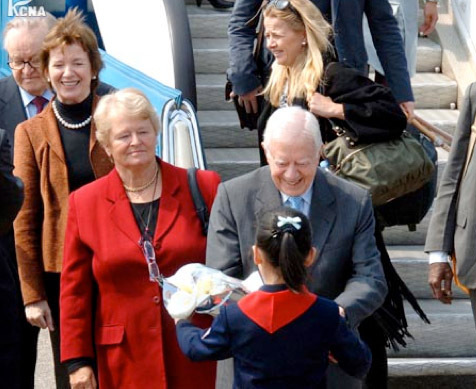 Israel and North Korea: Missing the Real Story:
Israel and North Korea: Missing the Real Story:
The Ha’aretz headline sums up the reality: “How the Mossad killed a deal with Kim Il-sung.” Or as Maariv had earlier scathingly put it, this is “a typical Israeli reality: struggles for power and prestige within the Israeli establishment, jealousy, hatred, scheming, concealment of information, stinginess, rivalry between parties and short-cuts in making critical decisions”. In brief, contra Palmor, in the mid 1990s his ministry was very much talking to North Korea – which initiated the contact. The agenda was missiles, and Pyongyang hinted it was prepared to be bought off; meaning it would stop selling them to Israel’s foes, but at a price. A senior foreign ministry official, Eitan Bentzur, reckoned this was worth pursuing. According to Ha’aretz, “Bentzur’s idea was that Israeli businesspeople would invest in North Korea – especially in the fuel industry, would run a gold mine at Onsan [sic - in fact Unsan] and would help it obtain a $1 billion loan”. It names three businessmen: Leslie Bond in the US, Shaul Eisenberg, and a former aide to Shimon Peres, Nimrod Novick. Bentzur visited Pyongyang in 1992, to discuss not only the above but also diplomatic ties. So much for Palmor’s unconsenting bride! Au contraire, the lady was evidently up for it. Two further rounds of talks were held in Beijing in 1993. According to Ha’aretz, Kim Il-sung (no less) suggested that contacts continue in Paris – via his own daughter Kim Kyong-hui and her husband Jang Song-thaek, who was running the missile program. Top-drawer stuff. Enter Mossad. Israel’s spy agency got wind of this plan, and rushed to Pyongyang to stop it. In a moment of high black farce, the two Israeli delegations each only learned that the other had been in town as well when they bumped into each other on the plane back to Beijing afterwards. (The foreign ministry officials were seated in first class, while Mossad had to slum it in tourist class.) One could well argue the pros and cons of buying North Korea off: a hardy perennial debate for all interlocutors. But in an added twist, the merits of the case weren’t even the point here. Furious at the Foreign Ministry for trespassing on its own patch (secret contacts), Mossad was doing the United States Central Intelligence Agency’s dirty work. They convinced premier Yitzhak Rabin to end contacts with North Korea, saying Washington was dead against. Yet – twist within twist – this wasn’t true. The US was quietly pursuing its own contacts with Pyongyang over the nuclear issue, culminating in the Agreed Framework signed by Bill Clinton after a nail-biting summer in October 1994. That’s a very compressed account. Like all good feuds, the FM-Mossad spat is still ongoing. It flared up a decade later when Mossad’s former head Ephraim Halevy – who went on that spoiler mission to Pyongyang – published a memoir, Man in the Shadows, in 2006. He was unrepentant, calling the Foreign Ministry’s plan to buy off missiles a “ridiculous … embarrassing farce”. The Foreign Ministry as such presumably couldn’t answer back, but the now retired Bentzur had no such inhibitions. Ha’aretz, clearly on his side, quotes him: “Shortsightedness, an urge to destroy the successful actions of others, and the lack of backbone in disagreements with the United States are inherent in Ephraim Halevy’s falsified description of the contacts with North Korea … His unwanted actions harmed clear interests of Israel and the Western world.” Turf wars apart, the point at issue is missiles. As matters turned out, in the Agreed Framework – now itself a dead letter, but let’s not beat about the Bush – the US focused on its own main worry: nukes. Pyongyang was given oil and other incentives to mothball its Yongbyon nuclear site. But the deal did not address what was on Israel’s mind, namely missiles. Ha’aretz concludes: “Thus, and not for the first time, the Mossad erred and torpedoed an important diplomatic move.”
-
Systematic Embezzlement Causes Food Crisis in Military:
North Korean authorities have been pursuing government stabilization through the military and under the slogan “Military-first Politics”. But soldiers on the front line are facing a dire situation where it is difficult to receive their fair distribution of three meals per day. The number of soldiers who choose to desert the military due to hunger and malnutrition is increasing. Soldiers pocketing products from the market or stealing food by breaking into citizens’ houses are becoming more prevalent.
-
South Korea Builds A Wall Of Missiles:
South Korea is spending over $2 billion to improve its anti-missile defenses. This will include expansion of existing Patriot PAC-3 anti-missile missile and Aegis systems on warships. One new system with be the U.S. THAAD (Theater High Altitude Air Defense). This will stop longer range North Korean ballistic missiles. THAAD went into production only four years ago.
South Korea is also ordering an Israeli early warning radar system, that will also serve as a central command and control system for anti-missile defenses.
What a waste of taxpayer money!

Powered by ScribeFire.
Filed under: East Asia, Eurasian Balkans, Food, Korea, Link Dumps, Military, USA, WMD Tagged: anti-missile defense, china, israel, mossad, north korea, thaad, tibet


Recent comments